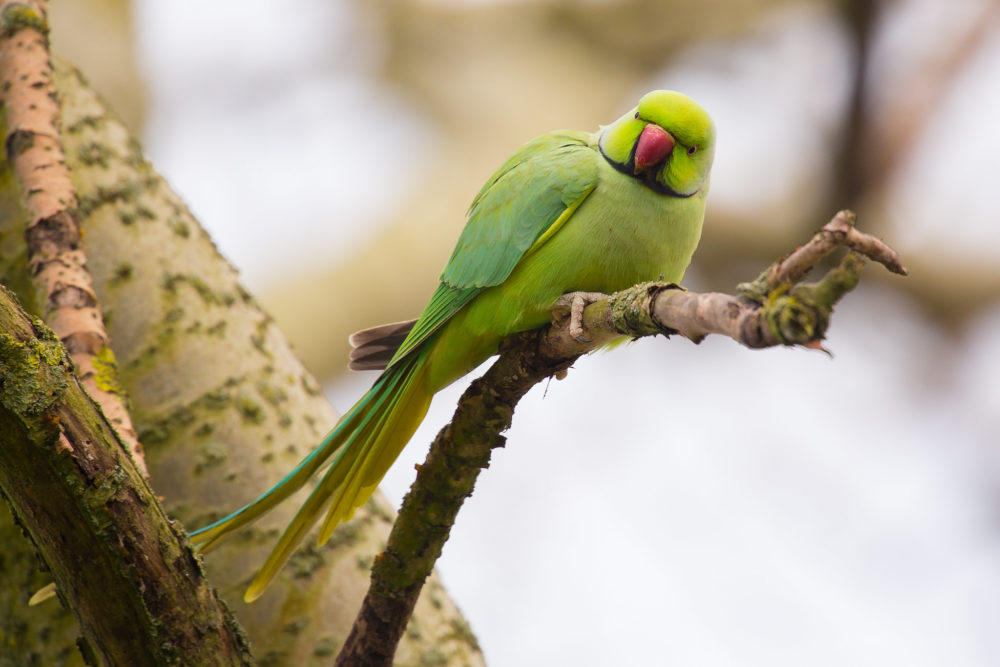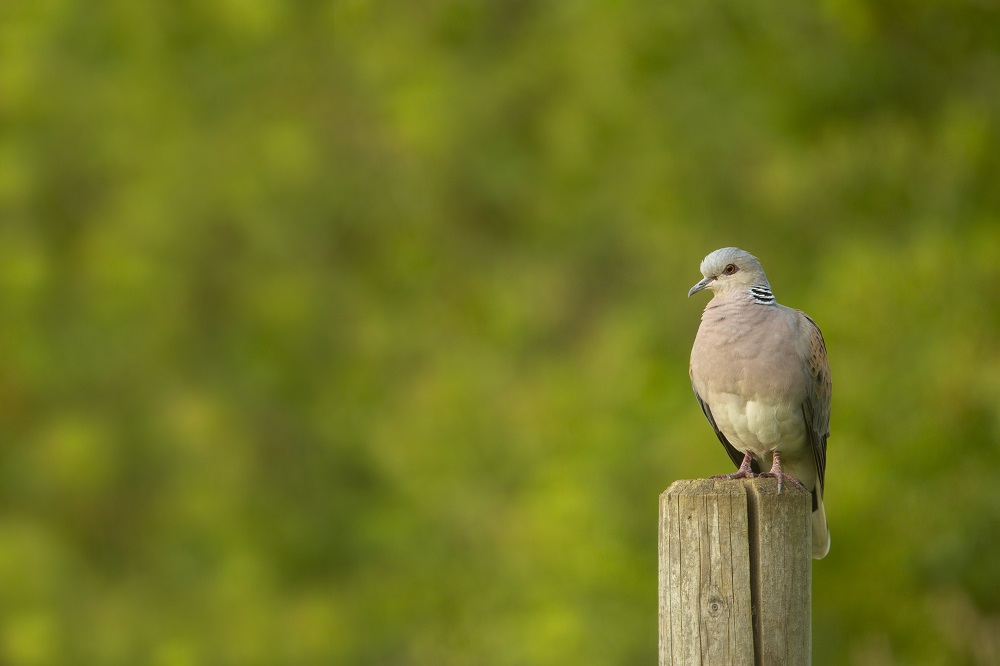Native birds see declines of up to 97% in less than 30 years

One of the UK’s longest-running citizen science initiatives has revealed an alarming decline in native bird species, while a number of non-native species are thriving.
During the breeding season, birds are at their busiest and wherever we may live, there will be a nest not too far away.
Whether it is a Blackbird in the park or a Mallard with ducklings on the local canal, many of us can witness the frenzied activity that this season brings.
For thousands of birdwatchers however, this is not just a time to casually observe these annual rituals – it signifies a period of dedicated, systematic information gathering which can help shape conservation outcomes.
For 30 years, a total of nearly 9,000 skilled enthusiasts have been contributing essential data to the Breeding Bird Survey (BBS), one of the UK’s longest-running citizen science initiatives.
The BBS is a partnership project organised by British Trust for Ornithology (BTO), the Joint Nature Conservation Committee (JNCC) and the Royal Society for the Protection of Birds (RSPB).

With around 3,000 volunteers taking part in any given spring and summer, collectively the nations’ birders have provided nearly 8 million records since the BBS was launched in 1994, allowing scientists to identify any notable changes in the status of our breeding birds.
Amazingly, at least 100 of these keen-eyed contributors have been submitting their observations for the entire three decades that the survey has been running.
Around 7,000 individual sites across the UK have been covered at least once in this time, the survey having grown from around 1,500 sites in its first year to around 4,000 each year for the last seven years.
“Steep decline”
The BBS, following on from its predecessor, the Common Birds Census, gathers information from across the UK and helps paint a clear picture of just how well, or not, the UK’s common and widespread land-based birds are faring.
By analysing the collected data, scientists can see that while some birds such as Goldfinch, Great Spotted Woodpecker and Nuthatch are doing reasonably well, others including Swift and Curlew are in steep decline.
Other species are faring differently in different parts of the UK; Tree Sparrow and Willow Warbler are both doing well in Scotland but not in England.
The reasons for these population changes are varied and the survey data allow scientists to investigate the potential drivers of change for each species.
In all, the information from the BBS helps to set bird conservation priorities in the UK, including Red-Listing, contributing to Indicators, and measuring nature recovery.
Since the start of BBS, the data have shown that Swifts across the UK have suffered significant declines of up to 66% since 1995.
For every ten Swifts that you may have seen screaming overhead thirty years ago, today you will only see four. Swallow numbers have dropped by almost a half in the last ten years.
For birds such as these, that rely heavily on aerial insects, any decline in these invertebrates means that there is simply less food for adult birds and their growing chicks.
A reduction of breeding sites can be mitigated by the provision of artificial nesting sites, but the issue of diminishing food resources is much more difficult to resolve.
These birds are not alone; of the 119 species monitored by BBS in the UK, 42 have decreased since 1995, while 35 have increased.

The species with the greatest decline is Turtle Dove, which has seen its numbers plummet by a staggering 97% and is now so rare that BBS cannot monitor it effectively, although the current hunting moratorium in Western Europe is giving cause for optimism that efforts to improve breeding habitats in England will support recovery.
Other farmland birds, like Grey Partridge (decline of 62% since BBS began), Yellowhammer (31%), Lapwing (51%) and Curlew (50%) are in a similar predicament, although well-evidenced and well targeted agri-environment measures can play a critical role in stemming the declines of these and other farmland species.
Mixed picture
Several species are increasing and expanding their range. Red Kites represent a major conservation success story of recent years and numbers have increased by 2,232% since the start of the BBS.
Little Egret, a relatively recent colonist, is the species with the greatest increase as numbers grew by 2,347% during the same time period.
A fifth of the species showing increases are non-native birds such as Ring-necked Parakeet and Egyptian Goose.

Dr James Heywood, BBS National Organiser, said: “The sheer volume of information that allows us to see the high and lows of our breeding birds is all volunteer gathered.
“Without the dedication of the UK’s BBS surveyors, we would not be able to see the changing fortunes of our bird populations, and with it look to identify causes and potential solutions.
“The report highlights declines in wide ranging groups of species, from birds reliant on insects, farmland and woodland birds, as well as pointing to additional and acute challenges like Avian flu.”

Dr Paul Woodcock, Joint Nature Conservation Committee, said: “Long-standing monitoring schemes, such as the Breeding Bird Survey, are critical to better understand the status of our natural environment and the pressures faced by our wildlife.
“Thanks to the collaborative effort of thousands of volunteers we have an invaluable dataset that informs policy, targets conservation action and evaluates success, as evidenced by the Red Kite recovery and by our understanding of which species are experiencing large declines.”
Simon Wotton, RSPB Senior Conservation Science, said: “The Breeding Bird Survey provides us with invaluable information about the state of our bird populations.
“By looking at this valuable long-term data we can see which species most need our help and where our efforts are best spent when addressing the nature and climate emergency.
“The changes in range and abundance of some of our bird species should give us cause for concern, and impetus for action.”
Support our Nation today
For the price of a cup of coffee a month you can help us create an independent, not-for-profit, national news service for the people of Wales, by the people of Wales.






Interesting, though I was surprised there’s no mention of the role of migration in avian life-cycles. Both the swallow and the swift, for example, migrate to and from sub-Saharan Africa where habitats are also under severe pressure.
A lot of money is spent to import millions of non native birds a year to blow them to bits in basically a very limited environment and managed for that one single use, to exclusion of all other species and disregard for the environment. Raptors are disappeared with regularity and not much in the way of protection. Then we grub up the hedgerows, poising the birds food and poison the birds directly. Shooting licences are given out because someone decide the birds are a pest and we have plastic lawns and we are changing the planets weather that disturbs and… Read more »
I can’t claim expertise about wild birds, but for a long time we’ve fed them throughout the year and that at least means that you notice which species of bird are attracted to the feeders. We started doing that round about the start of the new millennium when we were living in a rather leafy north of England city suburb, and we continued to do so after we moved a few miles further out to a place where the urban spawl gave out to farmland and open country. In both of those places I was surprised at the wide variety… Read more »